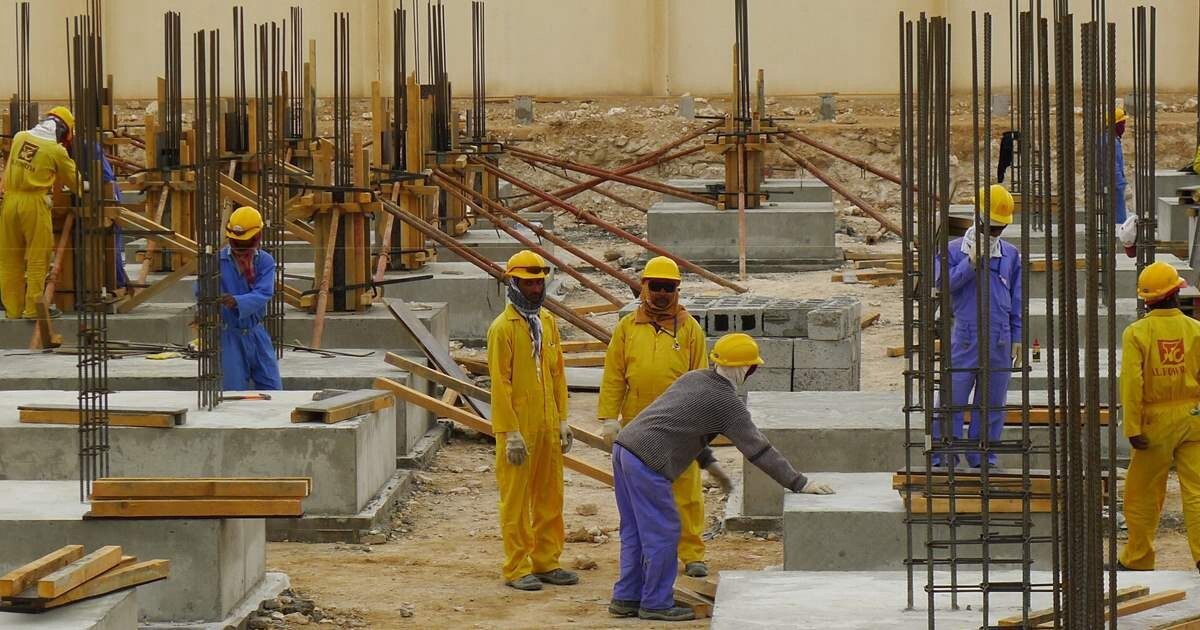The Ministerial Decision No. 16 of 2007 that prohibits work from 11:30 to 15:00 was only partially effective, prompting the need for additional measures.
The Ministry of Labour has begun carrying out awareness campaigns on the dangers of heat stress during working hours posed to migrant workers in the summer period. It’s in preparation for the enactment of Ministerial Resolution No. 17 of 2021, which introduces a significant expansion of summertime working hours during which outdoor work is prohibited.
According to the Government Communications Office, under the Ministerial decree No. 17 of 2021 announced on 26 May 2021, workers will not work in outdoor spaces between 10:00 AM and 3:30 PM starting from 1 June to 15 September. This replaces a legislation from 2007, that prohibited work in outdoor workspaces from 11:30 AM to 3:00 PM, between 15 June and 31 August.
In addition, irrespective of the time, all work must halt if the wet-bulb globe temperature (WBGT) rises beyond 32.1 degrees in a particular workplace. The WBGT index takes into consideration ambient temperature, humidity, solar radiation and wind speed.
The decision mandates that companies and institutions with designated work sites under direct sunlight to outline a schedule specifying daily working hours in accordance with the provisions of the decision. The entities must also situate the schedule in a conspicuous place for all workers to easily access.
The new measures will also oversee the requirements for annual health checks for labourers, as well as mandatory risk assessments to be prepared by enterprises.
“The new Ministerial Decision is an example of evidence-based policy-making, drawing on field research on the environmental conditions and the effectiveness of different mitigation strategies,” said Max Tuñón, from the International Labour Organisation (ILO) Project Office in Doha.
Throughout the month of May, Ministry of Labour’s inspection groups have carried out the yearly awareness program before the start of the implementation of the prohibition of labour in open areas during summer, by scattering awareness leaflets to workers across several work sites in the country as well as holding seminars and awareness meetings for workers and companies, Qatar News Agency said.
The ministry firmly called on company owners to cease violation of the provisions of the decision and its necessary implementation. Should the companies fail to implement the provision of the decision, legal measures will be taken accordingly.
The labour inspection teams will conduct field visits to the enterprises’ sites to ensure their compliance with the provisions of the decision in the approaching months.
Qatar’s labour awareness efforts
In 2019, the most in-depth study of its kind was conducted in the Gulf country to inform evidence-based strategies to help mitigate heat stress. The study was done by Qatar’s Ministry of Administrative Development, Labour and Social Affairs, the ILO and the Supreme Committee for Delivery and Legacy. Throughout the summer of the same year, the FAME Lab from the University of Thessaly was commissioned to gather data on labourers’ health and work intensity, covering more than 5,500 work hours.
The research project was undertaken to “accurately determine the magnitude of occupational heat stress and strain experienced by workers who perform manual labour in Qatar, and to customise and optimise mitigation strategies to safeguard workers’ health and wellbeing – without losing sight of the consequences for the local economy,” the report read.
The study lays out a total number of nine key findings. One such finding argues that heat stress conditions vary significantly according to different jobs, workshifts and work sites.
The research provides conclusive evidence that institutions can immensely reduce the risk of heat strain by inducing a comprehensive range of inhibition strategies.
Some of those suggestions included installing shaded areas every 100-200m, water stations with cool water and rehydration salts every 300-400m, ventilated areas and air-conditioned rest areas. In addition, the study suggested that workers be provided with mandatory water bottles to carry throughout their work shift.
In late April, Qatar’s Minister of Labour Ali Al Marri noted legislative updates and improvements in the labour department in recent years have been ‘continuous and sustainable’ and will continue after the World Cup.







